With Q4 being over and with the start of the New Year, many advertisers decrease their spending or turn off their ads to plan their strategy for the upcoming months. Additionally, the demand for certain products usually falls, but is that really a reason to completely turn off your ads? We wouldn’t say so – and here’s how to run Facebook Ads in 2025.
Why you should run Facebook Ads in January 2025
If you’ve been in the advertising world for a while, you know that seasonal changes affect the performance of your ads. For example, Q4 is usually the most expensive in terms of advertising. On the other hand, Q4 is the most profitable time of the year for many e-commerce businesses.
People are saving up and building their wish list for upcoming Holidays. So naturally, when the holidays come around and every e-commerce business starts to run promotions, people get excited and splurge on a variety of things.
Every e-commerce business wants to grab this opportunity and increase their sales as much as possible. And so of course, everyone starts to run Facebook Ads.
And we know what happens when the competition increases, right? The CPM (advertising price) starts to increase as well, reaching its highest level.
But what happens after the holiday season in the advertising world?
CPM opportunity
Believe it or not, January is one of the cheapest months in terms of advertising. Many businesses stop running their ads and therefore the competition decreases, leaving you with a much lower CPM.
Of course, the demand for certain products changes. People are not spending equally as they were during the holidays. However, this shouldn’t be the reason to turn off your ads.
In fact, this is a huge opportunity to test as much as possible, collect more data, and beat your competition.
Looking at the graph below, you can clearly see how the average CPM in the market changes during Q4 and at the beginning of January, reaching its highest point in November and then plummeting mid-December.
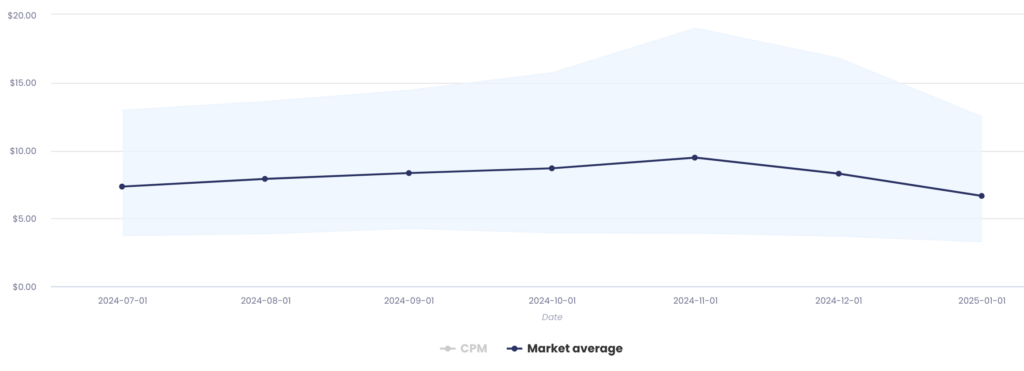
If we break this down by week, you can clearly see that, as we mentioned before, the CPM is the highest during the Black Friday weekend. The average CPM across the market reaches $9.43 and then drops to $6.63 at the beginning of January.

Additionally, if we look at the average CPM throughout the whole year, you can perfectly see that CPM drop from December 2024 to January 2025.

So if you still weren’t sure about running Facebook ads in January 2025, we hope that after reading this part of the blog post you’ve already changed your mind.
But what kind of strategy should you use? How do you know if your current ad setup is the best one possible? What should you focus on the most? Let’s go through everything you need to know.
How to audit your Facebook ad account setup
Whether you’re a Facebook ads beginner or a total pro, there’s always a possibility that you’re making a mistake in your ad setup that is then hurting your overall performance.
But the good news is that by performing an ad account audit you can ensure that your setup is on point and that you’re not making any mistakes.
There are many ways to do an ad account audit, but if you’re a Shopify business and you’re looking for a fast and accurate solution, our Advertising Audit feature might be the perfect fit.
After you connect your Facebook ad account with the Lebesgue app, you’ll immediately see your ad account score that is calculated based on how many red flags (mistakes) we’ve found in your ad setup.
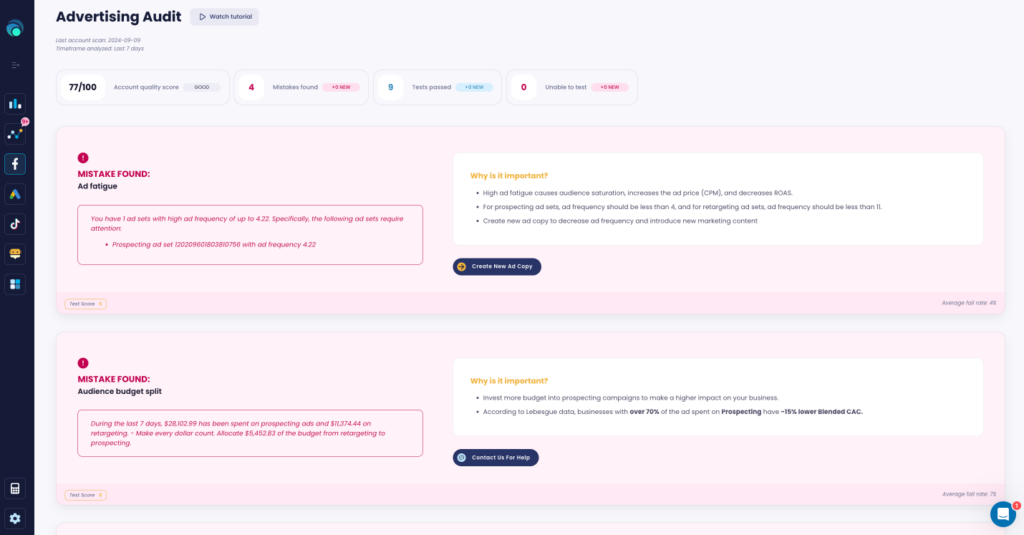
We have 12 tests in total that we run for Facebook Ads and eight for Google Ads. So if you’re running Google Ads in addition to Facebook Ads and want to check your setup, you can also do it within this feature in our app.
Apart from seeing which tests you’ve passed, you’ll also see which ones you’ve failed and how to easily fix them.
Now that you know how you can audit your ad accounts, let’s go through some of our tips for building a powerful Facebook Ad campaign.
How to set up your Facebook Ads for success in 2025
Simplify your account structure
When it comes to your ad account structure, believe it or not, the simpler the better. In reality, you only need to have two campaigns – one for prospecting and one for retargeting. In each campaign, we recommend having three to a maximum of 5 ad sets.
Each ad set should have its own ad, broken down by creative type so you can test them all out equally and properly. Speaking of testing, when you want to test something out, always test one thing at a time, keeping all the other variables the same.
For example, if you’d want to test a new copy, duplicate an ad set, and simply change that one thing – in this case, the primary text. This way you’ll easily understand which ad is the performance driver.
If you’re interested in learning more about Facebook’s structure for scale, we have a dedicated blog post that goes into more detail. But for now, let’s move on to the second tip.
Use the conversion objective
When creating your Facebook Ad campaign, the first thing to ensure is to choose the correct campaign objective.
Choosing the correct campaign objective is extremely important since this information tells Facebook your business goal, i.e., what you want to achieve by advertising on Facebook.
Long story short, you should always optimize for conversions as you ultimately want people to convert (purchase) on your website.
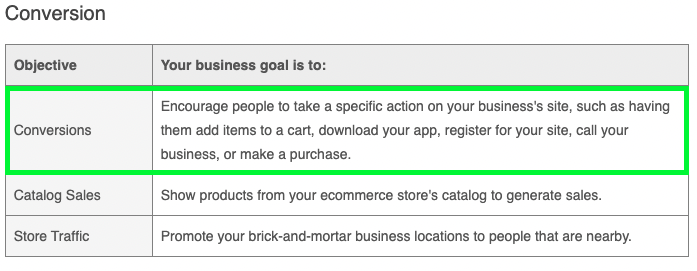
We often see advertisers choosing the Traffic objective over Conversions, but here’s why we don’t recommend doing so.
Choosing Traffic over Conversions would only result in Facebook finding you a lower-quality audience that will just land on your website, but not necessarily convert. You’re much more likely to get lower-quality traffic than when optimizing for conversions.
Choose "Purchase" as your conversion event
Once you’ve chosen conversions as your campaign objective, Facebook also requires you to specify a conversion event with the corresponding Facebook Pixel.
Similarly, you want to choose an event that matches your goal. So make sure to go for the purchase event since Facebook is going to focus on bringing people to your website that are most likely to complete that step.
Choose conversions as your ad set optimization
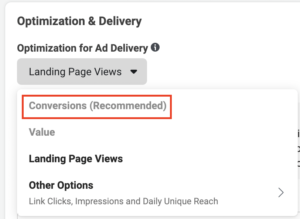
After specifying your campaign objective and conversion event, there’s one more thing you should do. And that involves choosing the correct ad set optimization.
The ad set optimization that you choose will also affect who sees your ads, and generally, how Facebook optimizes your ads.
So for example, if you choose to optimize for link clicks, Facebook will show your ad to people that are most likely to click on your ad.
On the flip side, if you optimize for conversions, which you should, Facebook will show your ads to people most likely to convert to your website.
Basically, the bottom line is to always match the ad set optimization to your campaign objective.
Use broad targeting
When it comes to Facebook ad targeting, most of you are probably familiar with all the options you can choose from. Some advertisers like to use Lookalike Audiences, and some Interest targeting, but over the last year, we’ve found that using broad targeting simply beats all the other targeting options.
What we usually like to do is choose a specific country we’d like to target without using any age, gender, or placement restrictions. The exception here is if you’re selling a product that is specifically made for women or for example, people that are over 40 years old. In that case, you should edit the age and gender demographics.
We tested broad targeting on many ad accounts and we’d say that the results have proven that Facebook can truly optimize ads better if you put fewer restrictions on the algorithm.
So if you’re using LALs or any other targeting option for your prospecting ads, try going for broad targeting and see if it works for you too.
Use your best creative
In terms of creative and ad copy, if you don’t know what’s your performance driver, January is definitely a good time to test it out.
A good strategy here would be to check what your competition is doing and get a few ideas for your ads.
Nowadays many tools give you some kind of competitor analysis, but if you want to get a detailed overview of your competitor’s marketing strategy, we’d suggest checking our Shopify app.
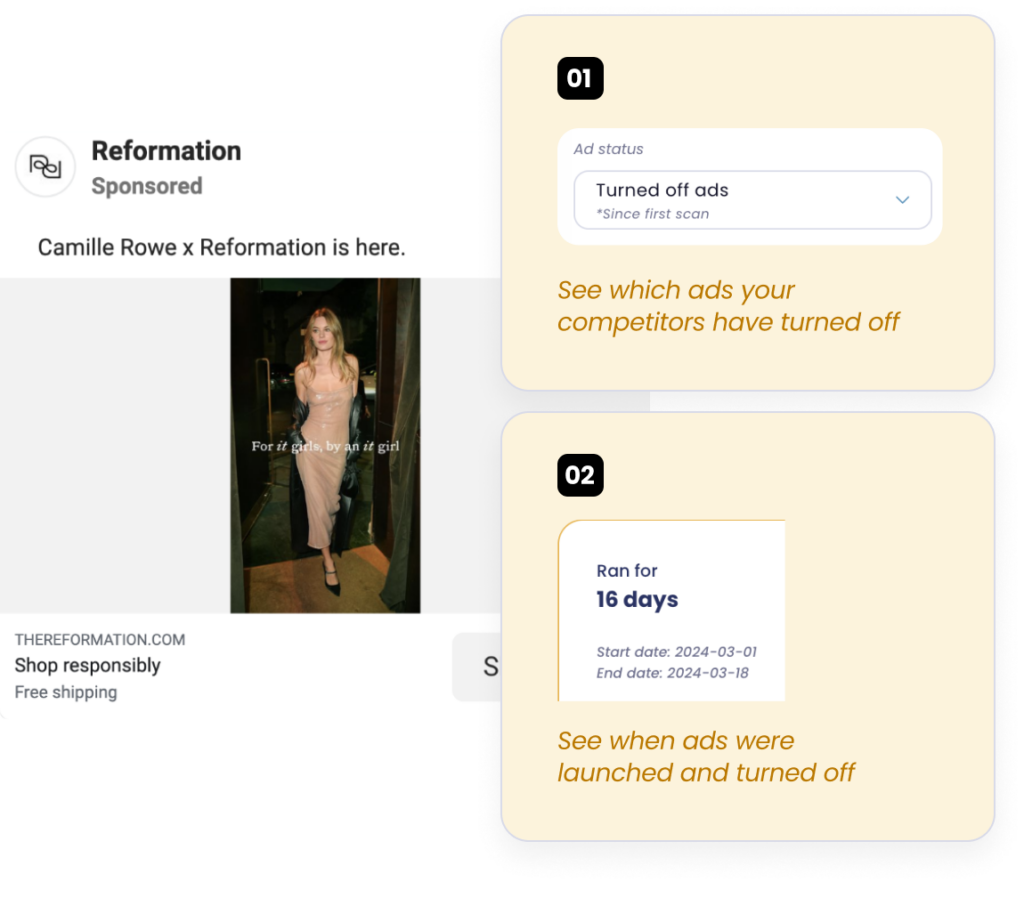
Within the Competitor Intelligence feature, you’ll be able to see which competitor of yours is considered an industry leader, you’ll also see their live Facebook & Google ads, which keywords they’re bidding on, and so much more. All of that will give you insights into where you can further improve and enhance your own strategy.
Use Advantage+ placements
When it comes to Facebook Ad placements, we’d always recommend choosing automatic placements over manual placements. Below you can see results from just one of many a/b tests that we ran to determine which placements perform best.
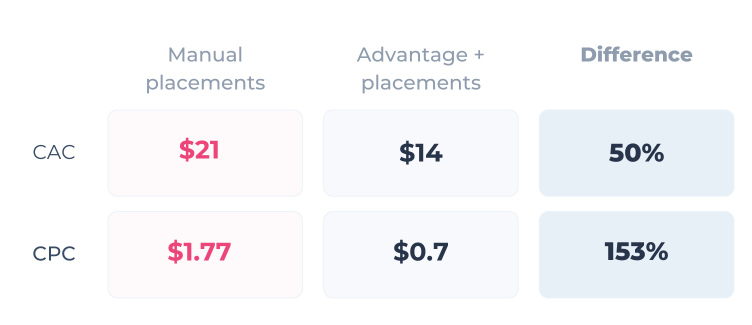
Advantage+ placements always outperformed manual placements by having a lower customer acquisition cost and cost per click as well. So if you’re currently using manual placements, try testing out automatic placements. The results may surprise you.
Use the Conversion API
If you’re still not using Facebook’s Conversions API in addition to the Facebook Pixel, now’s the time to implement it. It’s important to remember that the Conversions API doesn’t substitute your pixel. In fact, by using them together you can further improve your tracking and attribution.
The Conversions API integrates seamlessly with Shopify so you’ll find the whole installation process quite easy. For guidelines on setting it up, check out this article.
Summing Up
Ready to crush your next Facebook Ad campaign? Start by trying out some of our tips and always test, test, and test. The more data you (and Facebook) have, the better you can optimize your ads.
If you need any help with your Facebook ads or have some additional questions, feel free to drop us a line at [email protected] or reach us via our live chat. We are always happy to help and discuss the best ways of optimizing your campaigns.



